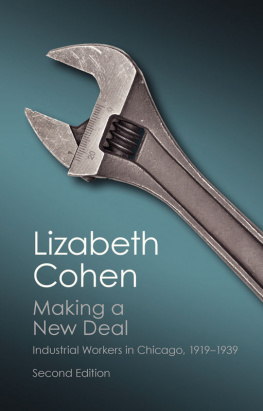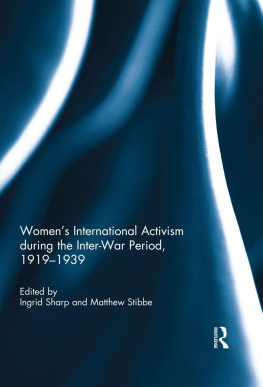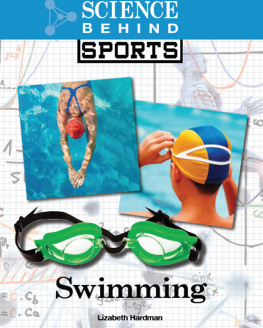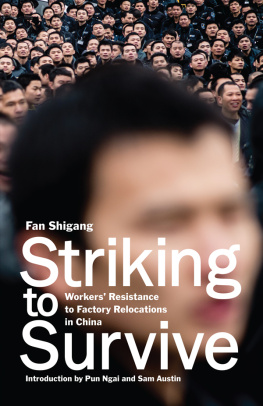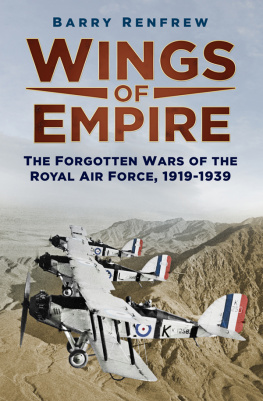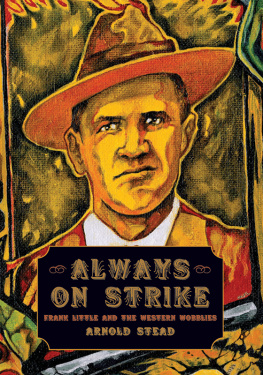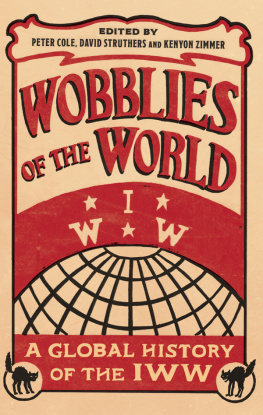Lizabeth Cohen - Making a New Deal: Industrial Workers in Chicago, 1919–1939
Here you can read online Lizabeth Cohen - Making a New Deal: Industrial Workers in Chicago, 1919–1939 full text of the book (entire story) in english for free. Download pdf and epub, get meaning, cover and reviews about this ebook. year: 2008, publisher: Cambridge University Press, genre: History. Description of the work, (preface) as well as reviews are available. Best literature library LitArk.com created for fans of good reading and offers a wide selection of genres:
Romance novel
Science fiction
Adventure
Detective
Science
History
Home and family
Prose
Art
Politics
Computer
Non-fiction
Religion
Business
Children
Humor
Choose a favorite category and find really read worthwhile books. Enjoy immersion in the world of imagination, feel the emotions of the characters or learn something new for yourself, make an fascinating discovery.
- Book:Making a New Deal: Industrial Workers in Chicago, 1919–1939
- Author:
- Publisher:Cambridge University Press
- Genre:
- Year:2008
- Rating:3 / 5
- Favourites:Add to favourites
- Your mark:
- 60
- 1
- 2
- 3
- 4
- 5
Making a New Deal: Industrial Workers in Chicago, 1919–1939: summary, description and annotation
We offer to read an annotation, description, summary or preface (depends on what the author of the book "Making a New Deal: Industrial Workers in Chicago, 1919–1939" wrote himself). If you haven't found the necessary information about the book — write in the comments, we will try to find it.
Making a New Deal: Industrial Workers in Chicago, 1919–1939 — read online for free the complete book (whole text) full work
Below is the text of the book, divided by pages. System saving the place of the last page read, allows you to conveniently read the book "Making a New Deal: Industrial Workers in Chicago, 1919–1939" online for free, without having to search again every time where you left off. Put a bookmark, and you can go to the page where you finished reading at any time.
Font size:
Interval:
Bookmark:
Making a New Deal
Second Edition
This book examines how it was possible and what it meant for ordinary factory workers to become effective unionists and national political participants by the mid-1930s. Lizabeth Cohen follows Chicago workers as they make choices about whether to attend ethnic benefit society meetings or go to the movies, whether to shop in local neighborhood stores or patronize the new A&P. Although workers may not have been political in traditional terms during the Twenties, as they made daily decisions like these, they declared their loyalty in ways that would ultimately have political significance. As the depression worsened in the 1930s, not only did workers find their pay and working hours cut or eliminated, but the survival strategies they had developed during the 1920s were undermined. Looking elsewhere for help, workers adopted new ideological perspectives and overcame longstanding divisions among themselves to mount new kinds of collective action. Chicago workers experiences as citizens, ethnics and blacks, wage earners and consumers all converged to make them into New Deal Democrats and CIO unionists.
First printed in 1990, Making a New Deal has become an established classic in American history. This second edition includes a new preface by the author.
Lizabeth Cohen is the Howard Mumford Jones Professor of American Studies in the history department of Harvard University. She is also the author of A Consumers Republic: The Politics of Mass Consumption in Postwar America (2003) and coauthor, with David M. Kennedy, of The American Pageant, a college-level U.S. history textbook.
Industrial Workers in Chicago, 19191939
Second Edition
LIZABETH COHEN
Harvard University


University Printing House, Cambridge CB2 8BS, United Kingdom
Cambridge University Press is part of the University of Cambridge.
It furthers the Universitys mission by disseminating knowledge in the pursuit of education, learning and research at the highest international levels of excellence.
www.cambridge.org
Information on this title: www.cambridge.org/9781107431799
Cambridge University Press 1990, 2008, 2014
This publication is in copyright. Subject to statutory exception and to the provisions of relevant collective licensing agreements, no reproduction of any part may take place without the written permission of Cambridge University Press.
First published 1990
First paperback edition 1991
19th printing 2006
Second edition 2008
9th printing 2013
Canto Classics edition 2014
Printed in the United Kingdom by CPI Group Ltd, Croydon CR0 4yy
A catalogue record for this publication is available from the British Library
ISBN 9781107431799 Paperback
Cambridge University Press has no responsibility for the persistence or accuracy of URLs for external or third-party Internet Web sites referred to in this publication and does not guarantee that any content on such Web sites is, or will remain, accurate or appropriate.
In memory of my mother
And for my father and Herrick
Maps
Plates
Since January of 1983 when I made my first research trip to Chicago, many people there and elsewhere have helped bring this project to fruition. Generosity with time, resources, and ideas has distinguished all the people I will acknowledge here and many others whose names I may have inadvertently omitted. Although this project is in the end my own, I feel that some of the collective spirit of the workers whose story this book sets out to tell has carried over to its production. Friends, family members, colleagues, and strangers all have left their mark, although not always in exactly the ways that they might have wanted. For what everyone of them has shared with me, I am sincerely grateful.
This book began as my dissertation at the University of California, Berkeley, where it was well nurtured by a committee made up of Paula Fass, David Brody, and Neil Smelser. My thesis director, Paula Fass, has been a constant source of inspiration and support since I began graduate school. Her brilliance has helped me at every turn, making my work infinitely better. Her unfailing commitment to me as teacher, colleague, and friend has been more important to my development than she can ever know. David Brody generously agreed to serve on my dissertation committee despite his affiliation with the Davis campus of the University of California. He gave me the benefit of his enormous critical faculties. I will always carry with me his counsel that complexity of analysis is best accomplished through simplicity and directness in writing and argument. Neil Smelser may have made history himself in being an outside reader who actually read the dissertation with great care and perception. I have appreciated his interest in me and my work since we read social theory together during my course work days.
Several friends and colleagues have at some stage read the entire manuscript and taken the time to share their criticisms with me. Given the length of this book, that was no simple task. Herrick Chapman, Frank Couvares, Gary Gerstle, Jim Grossman, Alice Kessler-Harris, Marjorie Murphy, Roy Rosenzweig, and Joe Trotter have all helped make this a better book. Over the years, many others have read and commented on specific chapters, which I have also appreciated. They include Ross Boylan, Sue Cobble, Kathy Conzen, Drew Faust, Mary Felstiner, Susan Glenn, Jim Gregory, Margo Horn, Becky Hyman, Mike Kazin, Ann Durkin Keating, Roland Marchand, Peggy Pascoe, Steve Ross, Debora Silverman, Judith Stein, Kat Weinert, Gavin Wright, and other members of the Berkeley Americanists Group and the Stanford Dissertation Writing Group. I have benefited as well from discussions of chapters presented to Gavin Wright and Paul Davids Social Science Seminar at Stanford University in 1986, the Working-Class History Seminar of the Pittsburgh Center for Social History in 1987, and the Urban History Seminar at the Chicago Historical Society and the Chicago Area Labor History Seminar of the Newberry Library in 1988. I have not been able to deal adequately with all the criticisms and suggestions I have received over the years, but I hope these colleagues will recognize the ways that they have improved my book.
A large number of people assisted me with my research in Chicago, helping me to locate sources as well as overcome fears that I would be considered a carpetbagger from California. I would like to thank Archie Motley, Linda Evans, Ralph Pugh, Janice McNeill, and my many other friends at the Chicago Historical Society; Mary Ann Bamburger in Special Collections of the University of Illinois at Chicago; Bob Rosenthal and Dan Meyer in Special Collections at Regenstein Library of the University of Chicago; John Jentz and Richard Schneirov, both formerly of the Newberry Library; Leslie Orear of the Illinois Labor History Society; Dominic Pacyga and Jim Martin of the Southeast Chicago Historical Project, now of Columbia College; Greg Linnes at the archives of International Harvester; Diane Davorick at the Hawthorne Works of Western Electric, when it was still standing; Leonore Swoiskin at the archives of Sears, Roebuck; Bill Benedict of the Theater Historical Society; John Kok at Foote, Cone and Belding Advertising Company; Bob Marshall at the Special Collections of the Chicago Public Library; John McCutcheon at the
Font size:
Interval:
Bookmark:
Similar books «Making a New Deal: Industrial Workers in Chicago, 1919–1939»
Look at similar books to Making a New Deal: Industrial Workers in Chicago, 1919–1939. We have selected literature similar in name and meaning in the hope of providing readers with more options to find new, interesting, not yet read works.
Discussion, reviews of the book Making a New Deal: Industrial Workers in Chicago, 1919–1939 and just readers' own opinions. Leave your comments, write what you think about the work, its meaning or the main characters. Specify what exactly you liked and what you didn't like, and why you think so.

